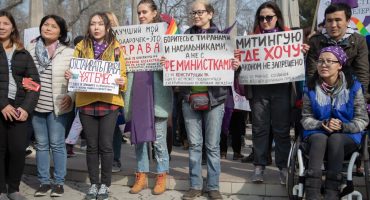Coronavirus SARS-CoV-2, causing SARS COVID-19 pneumonia, has led to appearance of a lot of fake, that is, deliberately misleading, information. During an all-out panic, it causes significant damage.
Follow us on Telegram
Such information can lead to discrimination on various bases, general distrust, weakened vigilance, or vice versa – increased panic.
It forces dozens of fact-checking editions to work hard in their sweat; in many countries of the world, including the countries of Central Asia, the dissemination of false information is punishable by law.
There are a lot of fakes about coronavirus. According to the chief editor of Factcheck.kz Pavel Bannikov, the international group The International Fact-Checking Network, which includes 40 fact-checking editorials from around the world, revealed over 1300 fake news in only two months of its work.
“And these are only viral materials (the most popular. – Ed.), which were reported in the media and actively spread in social networks. I am afraid to imagine how many materials were left unnoticed. Each of these 1,300 materials was spread to at least two or three countries. This is an enormous reach,” explains Bannikov.
The fact that fakes are spreading at an astonishing speed is explained by experts as follows: life, death, child safety, religion – almost all people relate to these topics. In addition, the reach of fakes depends on the cultural environment. For example, the fake that coronavirus is an electronic virus transmitted via the 5G link is popular in the USA, Germany, and Great Britain. In Central Asian countries, other versions are popular.
According to Bannikov, religious fakes featuring Chinese allegedly massively accepting Islam are very popular. Recently, there was a fake that Italians are supposedly massively accepting Islam.
The fact checker has analyzed searches over the past three months. According to Google and Yandex search indexes, the first place in Central Asia takes a fake that China has allegedly earned 20 billion US dollars on coronavirus – the shares fell in price and China began to buy them en masse. This fake was made out from an old mailing list that appeared during the annexation of Crimea, and it was not China that appeared in it, but Russia.
The editor-in-chief of the Uzbek news portal Anhor.uz Lola Islamova also notes the wave of fake information.
“At the beginning, there was a fake that God punished China for oppressing Muslims. There were fakes about treatment methods. There was a fake that pigeons die in our country due to spraying of the streets [with disinfectants – Tr.], but the streets are not sprayed here. This happened, as it turned out later, in Almaty,” Islamova said.
Using Google Trends tools, we found out that, for example, the search request “Italy joins Islam” most often came from Kyrgyzstan, and the request “20 million Chinese converted to Islam” came from Kazakhstan.
Where Do Fakes Come From?
Here are the most common coronavirus fakes in Central Asia:
- “Coronavirus was created by authorities on purpose”
- “In Bishkek, people infected with a coronavirus fall down unconscious”
- “The Internet will be shut off in Kyrgyzstan”
- “At Bishkek market “Madina”, the Chinese are forced out and their goods are taken from them.”
- “COVID-19 infection can be avoided by drinking water every 15 minutes.”
- “Cocaine, baby urine and garlic will help protect against coronavirus.”
- “If you find a hair in Qur’an, put it in a water and drink it, you can protect yourself from coronavirus”
- “85 million flowers with viruses were smuggled into Nur Sultan”
- “A Kazakh man committed suicide due to coronavirus”
- “Disinfectants will be sprayed from helicopters”
- “Bleach and cow urine protect against coronavirus”
- “The Chinese are massively accepting Islam, as the coronavirus bypasses the Muslims”
- “The Chinese authorities kill people infected with coronavirus”
- “Chinese restaurants in Kordai were burned due to people’s fear of getting coronavirus”
- “The Chinese infected with coronavirus travel to Russia through Kazakhstan”
With slight variations, almost each of these fakes were spread around in more than one country. For example, a fake about helicopter disinfection was widely spread in Kazakhstan, Kyrgyzstan, Tajikistan and Uzbekistan. In this fake message, neither the city, nor even the country was indicated, but this did not stop millions of people in the Russian-speaking space from believing it and panicking.
“Fakes come to us mainly from Ukraine, Russia, Kazakhstan – they adapt to our atmosphere. Fakes are distributed in instant messengers and social networks. There are also media outlets that do not check the information at all,” says Jamshed Marupov, editor of the Tajik portal FactCheck.tj.
According to Lola Islamova, fakes are popular because people have a fairly low level of critical thinking. People simply panic and spread unverified information. The information is distributed mostly through Telegram. This is due to the fact that it is quite inexpensive in terms of Internet traffic used, she adds.
The experts note that for some, the current epidemiological situation has become a way of pursuing their own interests. People not fond of China actively disseminated information inciting ethnic hatred. This quickly became popular, as the Sinophobic sentiment in the countries of Central Asia is strong.
The information distorting reality is not always disseminated by people who deliberately harm society. For example, on March 26, in Kazakhstan, a man saw people carrying out disinfection work, panicked and distributed among his relatives the information that a coronavirus infected was found in the village where this was happening. Relatives passed the information to their friends. Finally, the information reached law enforcement agencies.
“Unfortunately, due to the fact that people do not really trust the authorities and do not really trust the media, they tend to believe almost everything that arrives through personal channels, and these are primarily messengers. We do not see them and we do not fully imagine how many are being sent,” said Pavel Bannikov.
Sometimes, it is the media that misleads people. Kazakhstan is a bright case: the Tengrinews news portal published a news titled “A New Fatal Ailment. The first hantavirus-caused death has been recorded in China”.
Hantaviruses have been known to science since the 1950s and described back in the 1980s; this is not a new type of virus. Surely, they are dangerous, but they do not pose a great epidemiological threat due to the peculiarities of their spread – through the excrement of rodents. Publications in social networks and the media exploit the panic and give incomplete information, fact checkers reported later.
Thanks to a provocative headline, the news quickly became popular. In just a day, the number of views exceeded 400 thousand. It was actively reposted not only in the countries of Central Asia, but also in Russia.
Fighting Disinformation
In Uzbekistan, one may face a fine of up to nine thousand US dollars or three years of imprisonment for the production and storage of materials contributing to the spread of panic. Those, who distribute such information via the media and the Internet, can be sent to jail for up to eight years.
“People now control their language, what they say, because the law enforcement agencies now pay close attention. Liability for spreading false information has been introduced,” says Lola Islamova.
She believes that the best thing the government can do to prevent fakes from spreading is to provide information. In Uzbekistan, this process is working well now. According to her, the authorities instantly respond, the representatives of khokimiyat [local government authority – Tr.] can call at midnight and say: “There will be information coming in now, pay attention.”
Taking into account the state of emergency declared in Kazakhstan, the distributors of false information in this country are liable to restriction or imprisonment for a term of 3 to 7 years.
The distributors of fake information in Kyrgyzstan also face criminal sanctions. For example, on March 25, a man who posted a provocative social media story about an erroneous diagnosis of coronavirus was detained in Kyrgyzstan.
However, according to 24.kg, the lawyers highlight that law enforcement agencies cannot hold citizens accountable for spreading provocative rumors. According to the analysis of the legal clinic “Adilet”, the criminal law does not directly provide for any responsibility for the distribution of fakes.
In Tajikistan, the situation is different, since quarantine has not yet been introduced there.
“So far, no responsibility has been announced for the dissemination of false information, since we do not have quarantine, as in Kazakhstan. But if you consider in general, the laws provide for the punishment for the dissemination of false information. However, to what extent the Tajik authorities are ready for the appearance of a coronavirus, for the fight against fakes – it is another matter,” said Jamshed Marupov.
In Kazakhstan, coronavirus2020.kz website was created to broadcast official information – statistical information is published there with a high priority.
“The emergency operation command unit for responding to informational issues was created, with which I cooperate; we try to respond to all incoming questions, Kazakhstanis’ requests are forwarded here and, as much as possible, the Ministry of Health and the Ministry of Information and Social Development answer questions and provide clarifications. This is good. And they try to debunk some of the very obvious fakes,” says Pavel Bannikov.
The experts note that the number of fakes increases every day. Despite the work of the authorities, the World Health Organization (WHO) and fact checkers, a huge number of people do not trust anyone but their friends, who send unverified information in instant messengers.
For example, on March 25, an information appeared in the messengers that a person infected with coronavirus was sent by train from Nur-Sultan to a city X. One, who did not doubt for a moment the reliability of this received information, could have simply forgotten that trains are not operated in Kazakhstan right now.
If you have found a spelling error, please, notify us by selecting that text and pressing Ctrl+Enter.











